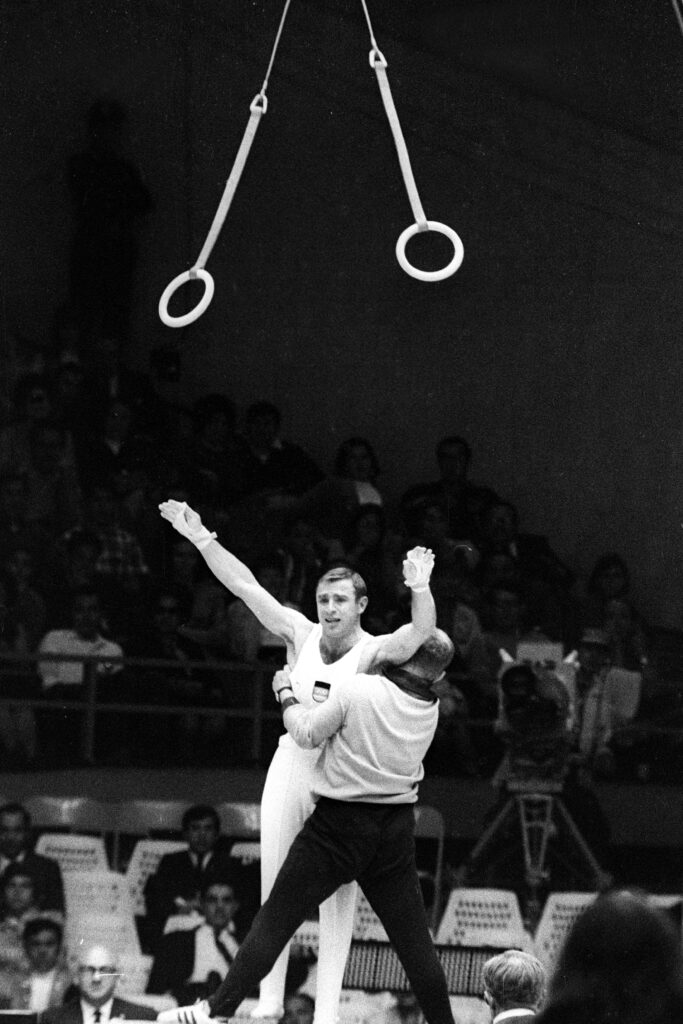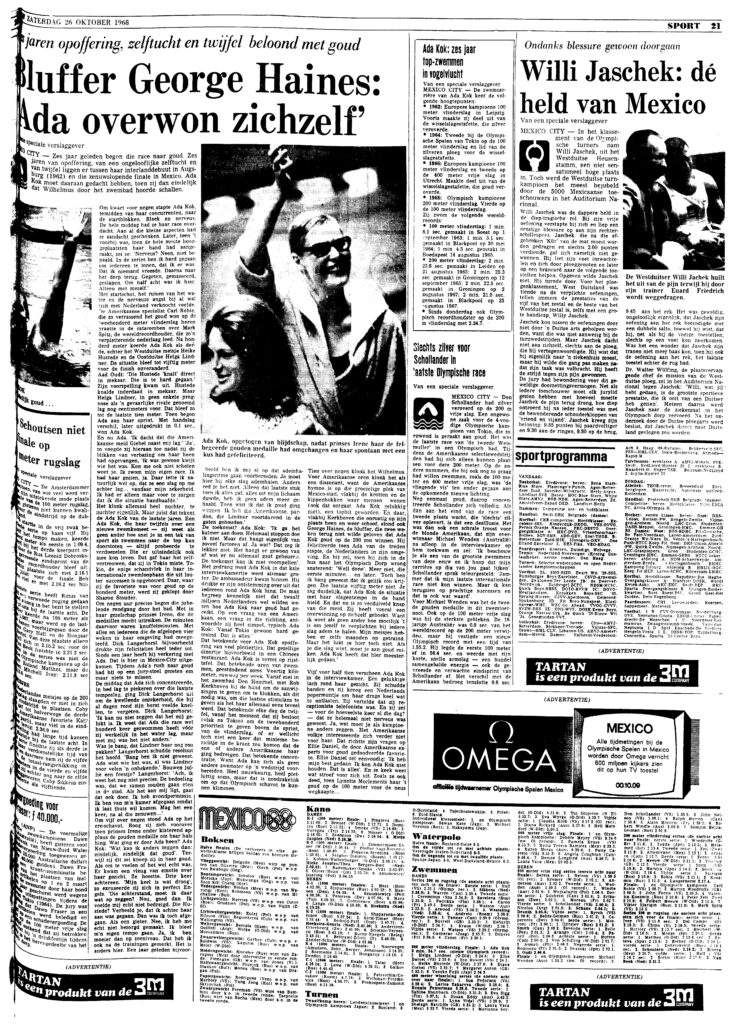In early April, Artur Dalaloyan tore his Achilles. In July, he competed and helped his team win an Olympic gold medal at the Tokyo Olympics in 2021.
It’s a jaw-dropping story, but it’s not the only jaw-dropping Achilles story in Olympic gymnastics history.
West German gymnast Willi Jaschek tore his Achilles during the optionals portion of the men’s competition in 1968. The injury happened on floor, his first event. Even though he was carried from floor to pommel horse on a stretcher, he finished out the meet, competing on pommel horse, rings, parallel bars, and high bar — all while landing on one foot.

What follows is a translation of an article from the Dutch daily newspaper Trouw, as well as one gym nerd’s commentary on Jaschek’s routines.
Trouw 26-10-1968
Willi Jaschek: The Hero of Mexico
MEXICO CITY — Willi Jaschek, from Heusenstamm in West Germany, did not place sensationally high in the standings. Yet the West German gymnastics champion was the most acclaimed by the 5,000 Mexican spectators in the Auditorium Nacional.
Willi Jaschek was the brave hero in a deeply tragic role. During his free exercise, he slipped and sustained a serious injury to his right Achilles tendon.* Jaschek, who had to be carried off the mat after that aborted floor routine and earned only 2.00 points, did not give up. He had his foot bandaged, and his teammates — and a stretcher later on — helped him to the next apparatus. Jaschek didn’t want to give up. He moved on. During the team competition, West Germany was tenth after the compulsory exercises. The performances of five of the six gymnasts count, and the best of the six West German gymnasts is Willy Jaschek, even with a large handicap.
Jaschek could not be helped by a German doctor between routines, because he was not present at the gymnastics competition. But Jaschek didn’t think about himself, only about the team he represented. He knew he was supposed to go to a hospital, but he didn’t want to go there until after his job was done. He has won the battle against his pain.
The judges admired his great perseverance. Like every spectator, every judge must have seen how much effort it took for Jaschek to ease his pain, how deeply moved he was after each apparatus with the admiring pats on the back from “friend and foe.” Jaschek got his reward: 9.55 points on the pommel horse, 9.30 on the rings, 9.50 on parallel bars, and 9.45 on the high bar. It was amazing — unbelievable actually — that Jaschek ended his high bar exercise with a double somersault, even though he knew that, as with the previous events, he could land only on one foot. Was it any wonder that Jaschek couldn’t hold back his tears any longer, after he had completed his routine on high bar, the last apparatus?
Dr. Walter Wülfing, the deputy chef de mission of the West German squad, told Jaschek in the Auditorium Nacional: “Willi, what you have done is the greatest sporting achievement I have ever seen from a German.” Immediately afterward, Jaschek was transported to the infirmary in the Olympic village. After an examination by the German team doctor, it was decided that Jaschek would be flown directly to Germany.**
*He tore his right Achilles (Achillessehnenriss). In a German interview on the eve of his 70th birthday, he talked about his experience, noting that the foot just “hung there” and that it was not possible to stretch it.
**An article from Limburgsch Dagblad (Oct. 26, 1968) added that Jascheck was flown to Frankfurt specifically. “A seat was reserved for him on the scheduled flight to Frankfurt. Dr. Ludwig Landgraf, the German team doctor, believes it is absolutely necessary that an operation be carried out as soon as possible. He would have preferred that the surgery take place in Mexico City, but Dr. Landgraf doubted he would be able to find a sufficiently skilled surgical team.”
BTW…
Writing for Modern Gymnast, Jerry Wright thought that the judges gave Jaschek sympathy points and overscored him.
Jaschek of West Germany was injured on his first pass in FX and was unable to continue his routines, he was then carried to the next event on a stretcher, hopped up to the [side horse] and did one of the finest routines you would hope to see and scored a well-deserved 9.55. Jaschek then proceeded to spirit the West German team to a fine performance and drew a few sympathy points from the crowd and judges. He was caught by the coach [Eduard Friedrich] on his dismount from the rings but did not suffer an appropriate penalty, scoring 9.3 when he should have lost 1.0 for the assist. He did a fine routine on the parallel bars and received 9.5 which was .1 or .2 tenth high but it was a fine job. To top it off he then limped up to the high bar and did an outstanding routine and finished with a double fly-way landing on his feet but falling forward to his hands and scoring 9.45 — all in all a remarkable performance.
Modern Gymnast, Nov/Dec 1968

Willi Jaschek: dé held van Mexico
Van een speciale verslaggever
MEXICO CITY — In het klassement van de Olympische turners nam Willi Jaschek, uit het Westduitse Heusenstamm, een niet sensationnel hoge plaats in. Toch werd de Westduitse turnkampioen het meest bejubeld door de 5000 Mexicaanse toeschouwers in het Auditorium Nacional.
Will Jaschek was de dappere held in de diep-tragische rol. Bij zijn vrije oefening verstapte hij zich en liep een ernstige blessure op aan zijn rechter achillespees. Jaschek, die na die afgebroken Kür van de mat moest worden gedragen en slechts 2.00 punten verdiende, gaf zich namelijk niet gewonnen. Hij liet zijn voet inzwachtelen en zich door ploeggenoten en later op een brancard naar de volgende toestellen helpen. Opgeven wilde Jaschek niet. Hij turnde door. Voor het ploegenklassement, West Duitsland was tiende na de verplichte oefeningen, tellen immers de prestaties van de vijf van het zestal en de beste van het Westduiste zestal is, zelfs met een grote handicap, Willy Jaschek.
Jaschek kon tussen de oefeningen door niet door ‘n Duitse arts geholpen worden, want die was niet aanwezig bij de turnwedstrijden. Maar Jaschek dacht niet aan zichzelf, slechts aan de ploeg, die hij vertegenwoordigde. Hij wist dat hij eigenlijk naar ‘n ziekenhuis moest, maar hij wilde die gang pas maken nadat zijn taak was volbracht. Hij heeft de strijd tegen zijn pijn gewonnen.
De jury had bewondering voor dit geweldige doorzettingsvermogen. Net als iedere toeschouwer moet elk jurylid gezien hebben met hoeveel moeite Jaschek de pijn terug drong, hoe diep ontroerd hij na ieder toestel was met de bewonderende schouderkloppen van “vriend en vijand.” Jaschek kreeg zijn beloning: 9.55 punten bij paardvoltiger en 9.30 aan de ringen, 9.50 op de brug, 9.45 aan het rek. Het was geweldig, ongelooflijk eigenlijk, dat Jaschek zijn oefening aan het rek beëindigde met een dubbele salto, hoewel hij wist, dat hij, net als bij de vorige toestellen, slechts op een voet kon neerkomen. Was het een wonder dat Jaschek zijn tranen niet meer baas kon, toen hij ook de oefening aan het rek, het laatste toestel achter de rug had.
Dr. Walter Wülfing, de plaatsvervangende chef de mission van de Westduitse ploeg, zei in het Auditorium Nacional tegen Jaschek: “Willi wat jij hebt gedaan, is de grootste sportieve prestatie, die ik ooit van een Duitser heb gezien.” Meteen daarna werd Jaschek naar de ziekenzaal in het Olympisch dorp vervoerd. Na het onderzoek door de Duitse ploegarts werd beslist, dat Jaschek direct naar Duitsland gevlogen zou worden.
More on 1968